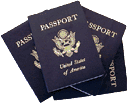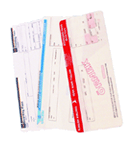Links to Remember
Pre–Departure Planning
In this section, you will find useful information on how to select a travel provider, decide which guidebook is right for you, learn how to tune–in your favorite Israeli radio station, and find out what documents are necessary for study abroad in Israel. Before you buy anything, research your choices, select a travel provider, and find out what documents are necessary for study abroad in Israel.
1. Where to Buy
 Travelers have numerous options when it comes to purchasing tickets. Travel agents are a traditional option, but several student–oriented travel agencies can offer discount fares. Other young adults, who have recently studied abroad themselves, often staff these student agencies. Therefore, they can be more knowledgeable about travel abroad. Many student agencies offer exclusive student or youth travel discounts. Some discounts may be valid for a full year, an extended time limit that most regular travel agencies do not offer.
Travelers have numerous options when it comes to purchasing tickets. Travel agents are a traditional option, but several student–oriented travel agencies can offer discount fares. Other young adults, who have recently studied abroad themselves, often staff these student agencies. Therefore, they can be more knowledgeable about travel abroad. Many student agencies offer exclusive student or youth travel discounts. Some discounts may be valid for a full year, an extended time limit that most regular travel agencies do not offer.
Student travel agencies may be the most discount–oriented. Checking with several of them may help you to establish a base price, or sometimes you may even get a reasonable fare. If you are extremely flexible, many airlines offer last minute airfare deals that can even be cheaper than student tickets.
Buying online is yet another option. Most sites post new discount offers three times a day. Some also offer the possibility of bidding for tickets at your own specified price. If your bid is accepted, you could end up flying for a very low price. However, be wary of restrictions on bidding (like not being able to back out of the deal once your bid has been accepted, and not being given a choice of airlines or flight times).
When you have decided where to purchase your airplane ticket, many travel experts recommend paying with a credit card. Several credit card companies offer insurance on purchases; should your tickets be lost or stolen, or you flight cancelled, you needn't lose all your money. Check with your credit card company to determine what conditions of protection apply.
2. Travel Documents
Proper documentation and identification is required for entry to Israel and for re–entry into the United States. Israel has its own special requirements for entry based on your citizenship, purpose of visit and length of stay. Find out which requirements pertain to your situation, and plan in advance; obtaining documents from embassies or consulates can take from one hour up to three months. Getting a new passport may take up to six weeks.
 Passport: A passport is a document from your home country that confirms your citizenship. You need a current passport that is valid beyond the time your program ends. Allow up to six weeks to receive a U.S. passport. It may take even longer to obtain a passport if you are a non–U.S. citizen. If you are applying for the first time for a U.S. passport, you must complete 6 steps:
Passport: A passport is a document from your home country that confirms your citizenship. You need a current passport that is valid beyond the time your program ends. Allow up to six weeks to receive a U.S. passport. It may take even longer to obtain a passport if you are a non–U.S. citizen. If you are applying for the first time for a U.S. passport, you must complete 6 steps:
- Fill out an "Application for Passport" Form DS–11 which you can obtain from your local post office or Passport Issuing Office
- Present proof of U.S. citizenship
- Present proof of identity
- Provide two appropriately sized passport photos
- Pay the applicable application fee
- Provide a valid Social Security number
- Birth Certificate Information: If you are unable to provide a birth certificate for proof of U.S. citizenship and have not been able to find record of your birth in government records, you will need to complete a number of additional steps to document your citizenship. These involve going in person to the Passport Issuing Office in your city, providing an extensive list of signed and notarized documents to prove your identity, presenting a Letter of No Record and other documentation showing the date and place of birth, providing a notarized statement from a blood relative that was present at the time of birth, and providing copies of your parent(s) death certificates if applicable. For detailed information and a list of the documents that are required for proof of your citizenship and acceptable forms of identification, please visit Passport Services and Information: How to Apply In Person.
If you are still having difficulties providing legal public records of your birth there are a few other sources you can investigate:
- Internal Revenue Service: This office might be able to provide you with your parents' address(es) at the time of your birth and when they began claiming you as a dependent, which may help underscore your "legal existence."
- Social Security Administration: This office should have a copy of your original application on file, and, if you were young enough, it might have been filed for your by the hospital of birth which would back him/her into those records. At the least, it would confirm your parentage and age, and may also provide the county/address of your parents at the time of your birth or application.
- National Center for Education Statistics: Even if your elementary school is no longer in existence, the National Center for Education Statistics, the statistics gathering entity for the U.S. Department of Education, should have your record of attendance on file.
- State Office of Vital Statistics: This database should have record of your birth, or at least some record of your parents.
Some other ways to help establish proof of birthplace, residence, etc. include:
- Parents' marriage certificate, old mortgage or bank documents, parents' credit report: these documents might give clues to your early addresses.
- Parents' health insurance records (from employer or government) for proof of your coverage as a child.
- Family doctor, who may be able to provide medical/immunization records dating back to early childhood/birth.
- Contact your U.S. Senator (preferably one with seniority), local Congressperson or State Representative for assistance.
- Visa: A visa is a document, provided by Israel or another country to which you will be traveling, which confirms your legitimate status as a foreign student. Not all countries require a visa. A visa is generally attached to a passport, so having a passport is necessary before you can apply for a visa. Some visas are free and easy to acquire, while others may cost over $100 and require a lot of documentation and planning ahead. Check with the U.S. State Department – or the Israeli embassy or consulate – to determine if you will need a visa, and for information on how to apply for a visa if you do need one. Your study abroad advisor can also help provide information on obtaining a visa. Israeli officials may require you to have a letter of acceptance, proof of insurance, and proof of sufficient funds before they will issue you a visa. A letter from your program provider confirming all of the above may be sufficient in some cases.
 Tickets: As most students will fly to Israel, your plane ticket will serve as your primary travel document. For others, a train or bus ticket may suffice. Some countries will require you to show that you have a return or ongoing flight scheduled within the allotted time for your visa. Student visas can last from one month to one year depending on the country where you will be studying or traveling. If you plan to stay longer, you will need to extend your visa.
Tickets: As most students will fly to Israel, your plane ticket will serve as your primary travel document. For others, a train or bus ticket may suffice. Some countries will require you to show that you have a return or ongoing flight scheduled within the allotted time for your visa. Student visas can last from one month to one year depending on the country where you will be studying or traveling. If you plan to stay longer, you will need to extend your visa.- Proof of Sufficient Funds: Israel may also require proof of self–sufficiency while abroad. You may be asked to provide a bank statement with your current balance to show that you have enough money to pay for your needs while in Israel without having to ask the country to provide you with monetary assistance.
- Letter of Acceptance: You may be required to show an official letter of acceptance or invitation to study abroad in Israel.
- Proof of Insurance: You should have an insurance card or other document verifying that you have travel and health insurance to cover you for the entire time you will be in Israel.
 Prescriptions (Translated): If you require prescription medications while in Israel, you will very likely need to verify this requirement with a doctor's note. You may need a specially notarized prescription, translated into Hebrew, if the Israeli pharmacy you go to does not recognize U.S. prescriptions.
Prescriptions (Translated): If you require prescription medications while in Israel, you will very likely need to verify this requirement with a doctor's note. You may need a specially notarized prescription, translated into Hebrew, if the Israeli pharmacy you go to does not recognize U.S. prescriptions.- Confirmation of Good Health: Israeli officials, or your program administrators, may require that a health form or letter of good health (confirmation that you are free from certain diseases, etc.) be provided to obtain a visa.
- Confirmation of Vaccination: You may also be asked to show proof of having received certain vaccinations to travel in regions with endemic diseases, like cholera, yellow fever, etc.
- Copies of Travel Documents:Along with your originals, bring a copy of all travel documents and leave copies of your travel documents with a contact in the United States and in Israel. Remember to keep copies in a safe place, separate from where you keep your original documents.
 International Student ID Card: You should consider purchasing an International Student ID Card (ISIC) as this can provide discounts, helps verify your travel purposes, and includes a limited amount of insurance and 24–hour assistance.
International Student ID Card: You should consider purchasing an International Student ID Card (ISIC) as this can provide discounts, helps verify your travel purposes, and includes a limited amount of insurance and 24–hour assistance.
3. Other Responsibilities
- Voting: You may want to register to vote in U.S. elections while you are abroad in Israel. You can obtain absentee ballots abroad through your consulate or embassy. You can also contact your local board of elections officials.
- Power of Attorney: Getting "power of attorney" allows you to designate a person who would control your assets and other personal information in the event you become unable to do so. Power of attorney makes the person you designate able to withdraw your money, deposit money for you, and write your checks; His or her signature counts as your signature. You and your designated person will need to go to your bank(s) in order to set up this type of power of attorney. A notary public can also set up power of attorney for you so that the individual you designate can control not only your assets, but also other paperwork requiring your signature.
- Paying Bills: There are several ways to pay your outstanding U.S. bills while in Israel. Credit card bills, cell phone bills, and some debt payments can be paid on–line through a personal Internet account. Check to see whether or not your credit card company or cell phone carrier offers this billing option. If you can't pay your bills on–line, consider paying them in advance before you go abroad. You could also leave payments with a trusted, close friend or family member if he or she is willing to send in your payments for you.
4. Relevant Questions
- Where do you get a visa if needed and a passport?
- What other documents are required by the country of your choice, in order to be issued a visa (a bank statement, letter of invitation, police record, proof of insurance, etc...)?
- What should you do if you lose your passport or visa while in the country of your choice?
- Have you inquired about getting an International Student Identification card (ISIC card)?
- What do you have to do to vote in U.S. elections (primary, run–off, special and general) while you are in the country of your choice?
- Have you set up power of attorney to make decisions on your behalf back home if you are unable to?
5. Checklist
- I have compared ticket prices offered by travel agents, student agencies and websites.
- I have a valid passport and visa.
- I know whether or not my program requires me to show proof of insurance, provide a doctor's letter or confirmation of sufficient funds.
- I have made multiple copies of all important travel documents.
- I have registered to obtain absentee ballots so I can vote in U.S. elections while in the country of your choice.
- I have set up power of attorney.
- I have established how I'm going to pay my outstanding U.S. bills while in the country of your choice.
6. Resources
- AllAbroad.us – Insurance Mentors answer the question about seeking additional health insurance when abroad.
- AllAbroad.us Racism and Gender Mentors answer questions about discrimination students may face abroad and how to cope with these issues.
- AllAbroad.us – Travel Documents Mentors answer questions about travel documents needed before going abroad.
- AllAbroad.us Vaccinations Mentors answer the question about getting vaccination before traveling abroad.
- CDC Vaccination Information From the National Center for Infectious Diseases, critical information on what vaccinations are necessary or suggested before traveling to certain countries.
- FAQs: No record of birth What to do in the event you do not have record of your birth for proof of U.S. citizenship.
- Federal Voting Program Provides links to state voting officials, state voting requirements and forms to register absentee and request ballots.
- GlobalScholar.us: Go to Course 1, Module 4, Task 5 "Discrimination Overseas" to learn about coping with stereotypes, discrimination, and the challenges of diversity overseas.
- Passport Services and Information Extensive information on passports, passport services, restrictions, fees, where to apply for a passport, etc.
- Screening for Mental Health, Inc. Provides resources for nationwide mental health screening programs and to support cooperation, professionalism, and accountability in mental illness screenings.
- StudyAbroad.com Handbook: Insurance Brief three point guideline for obtaining appropriate health insurance.
- Travel Document Systems More detailed information about entry requirements.
- U.S. Customs Information all travelers should know before they enter or leave the U.S.
- U.S. State Department: Judicial Advice and Assistance Helps American abroad who are in need of judicial assistance or advice on procedure.
- Voicing Concern About Discrimination Abroad SAFETI Online Newsletter article by Christa Sanders, CoFounder of Voices of Change, gives a countryspecific example of discrimination encountered abroad.




 Israel
Israel


